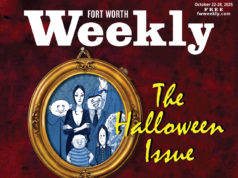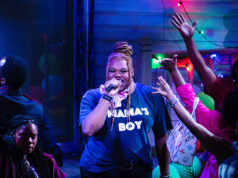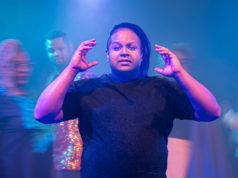Perhaps the best way to describe Fort Worth Opera’s production of Angels in America, composer Peter Eötvös and librettist Mari Mezei’s adaptation of playwright Tony Kushner’s Pulitzer Prize- and Tony-winning “Gay Fantasia,” is to tell you what it is not.
It is not a traditional opera, with characters whose motives are boldly outlined and who face the audience and belt out arias every other scene. Nor does it have a traditional narrative, with a clearly identifiable beginning, middle, and end. And lastly and most importantly, it is not the kind of thing you’d expect from a traditionally bent opera, especially in, of all places, a traditionally bent town like Fort Worth.
The FWO should get points just for staging a work whose brilliance is in its subtleties and that requires heavy lifting from viewers – at Sunday’s matinee performance, about a third of the audience left during intermission. The opera has been seen in only two other cities since its creation in 2004 – Paris’ Châtelet Theatre and Boston’s Opera Unlimited – and most people know of Angels only as that HBO miniseries from 2003, starring Al Pacino and Meryl Streep. But FWO delivered an incontrovertibly transcendent stage experience and, for that reason, deserves unending hosannas.
As a mostly expressionistic piece, Eötvös’ Angels is true to the seven-hour play, favoring mood over meaning and character over plot. Kushner wrote the piece 15 years ago as a response to Reagan America’s non-response to the AIDS epidemic ravaging the gay community. His work dared to give names and faces to the disease, which largely accounted for the piece’s muscle (even if only as artful agitprop). The disease looms as heavily onstage as the supernatural and human characters: Roy Cohn, the closeted homosexual power-attorney who has AIDS but is publicly homophobic; Joe Pitt, another closet case but one who is married to a self-delusional train-wreck, Harper; and Louis Ironson, an openly gay Jewish man with commitment issues, and his partner, “the prophet” Prior Walter, whose body is racked with AIDS.
The times, they have a-changed. In Eötvös’ operatic version, the disease is still prominent though largely toothless, mainly because the composer shuns the historical context. The savvy contemporary theatergoer (a.k.a., the average FWO audience member) knows that AIDS is no longer an automatic death sentence. Advances in medicine have allowed many sufferers to live relatively normal lives.
Eötvös could have given the disease teeth again by doing a good job of transporting the viewer to the Reagan era, by placing him or her beneath the vast cloud of the time’s fears: an HIV diagnosis, nuclear holocaust, economic annihilation. Instead, all he offers are a few visual and rhetorical references to the early ’80s, including extras dressed as punk rockers and a filmed monologue screened against a giant Soviet flag.
He also doesn’t truly evoke the feel of AIDS as a societal problem, a public tragedy. The suffering of Eötvös’ characters, both physical and emotional, is hermetically sealed in hospital rooms, bedrooms, and offices. In downplaying the epidemic’s larger, societal ramifications, he basically strips Death of his scythe. Might as well have given them cancer or alcoholism.
No matter, though. Eötvös’ Angels is bold and original enough to stand alone, and it rejects the “socially relevant” label and cheap, forced parallels to the New Dark Ages (today). Like an expressionist painting or free-verse poem, Angels is beyond the crude coils of language and time, and almost beyond the timeless operatic theme of death itself. And there’s little doubt that Eötvös’ marvelous handiwork could have been realized any better than by FWO last Sunday.
Staged by David Gately (Dallas Opera, Seattle Opera), FWO’s Angels in America is set mostly in shadow on an empty stage across which the punk rockers move rolling set pieces and scaffolding. The spotlights were white and precise, seeming to come from within the characters rather than shining down on them. Twinkling softly over the mises-en-scene were tiny lights that suggested twilight or will-o-the-wisps. Most but not all of the dialogue was sung. To a person, all of the singers – some played multiple roles – were exceptional. David Adam Moore used his body almost as much as his stern-talking yet emotionally fragile voice to outline Prophet Prior, a character who alternates between physical pain and lightness of being, between earth and heaven. As the booming, bastardly lawyer Roy, Kelly Anderson also cut a perfectly wrought profile, of a person whose denial runs so deep that death can’t breach his defenses even when he’s alone.
Ava Pine was pure coloratura and luminosity as the Angel. Janice Hall affected Jewish and Russian accents for specific singing and speaking parts, Craig Vern was a little stiff but sure of voice, and Erin Elizabeth Smith was the picture of grief as Harper. Conducted by Christopher Larkin (New York City Opera, Washington Opera, Santa Fe Opera), the Fort Worth Symphony Orchestra deftly handled the weighty demands of Eötvös’ ultra-contemporary score, plucking strings ominously, easing out of false crescendos, and even mimicking chattering voices.
The balance between drama, black comedy, and melodrama is excruciatingly delicate here and the slightest false note would have been thrown into stentorian relief. Sunday’s show was as close to flawless as humanly – or angelically – possible.
Angels in America
Thru May 24, 28, and 31 and June 4 and 7 at W.E. Scott Theatre, inside the Fort Worth Community Arts Center, 1300 Gendy St, FW. $17-52. 1-877-FWOPERA (396-7372).











